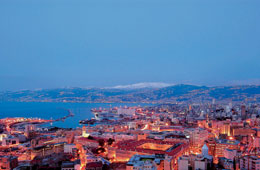by Nayla Razzouk  BEIRUT (AFP) – Lebanon has welcomed a UN Security Council resolution calling on former powerbroker Syria to establish formal diplomatic relations with Beirut and demarcate their border, which prompted Damascus to claim interference it its affairs. Meanwhile, in a sign of ongoing strife between the two neighbors, pro-Syrian Palestinian militants and Lebanese army troops each beefed up their presence near the border following clashes that wounded two people a day earlier.
BEIRUT (AFP) – Lebanon has welcomed a UN Security Council resolution calling on former powerbroker Syria to establish formal diplomatic relations with Beirut and demarcate their border, which prompted Damascus to claim interference it its affairs. Meanwhile, in a sign of ongoing strife between the two neighbors, pro-Syrian Palestinian militants and Lebanese army troops each beefed up their presence near the border following clashes that wounded two people a day earlier.
"The resolution is good because it encourages both brotherly countries to cooperate in order to implement two issues that were adopted by the national dialogue," or ongoing reconciliation talks among Lebanese leaders, Lebanese Prime Minister Fuad Siniora said Thursday.
Those issues are the establishment of formal diplomatic relations and the demarcation of the border, Siniora told An-Nahar newspaper. "Lebanon, as a state, did not have a say in it (the resolution), and we tried to soften the terms that were used and we succeeded in softening the terms," Siniora added.
 BEIRUT (AFP) – Former Christian warlord Samir Geagea has said that the four Iranian diplomats kidnapped in 1982 in Lebanon by members of his now defunct Lebanese Forces militia died at least 20 years ago.
BEIRUT (AFP) – Former Christian warlord Samir Geagea has said that the four Iranian diplomats kidnapped in 1982 in Lebanon by members of his now defunct Lebanese Forces militia died at least 20 years ago. HALWA, Lebanon — Clashes broke out on Wednesday between the Lebanese army and pro-Syrian Palestinian guerrillas near the Syrian border, wounding two people, and a soldier was detained for several hours, police said.
HALWA, Lebanon — Clashes broke out on Wednesday between the Lebanese army and pro-Syrian Palestinian guerrillas near the Syrian border, wounding two people, and a soldier was detained for several hours, police said.  ntain fort close to Israel’s heavily guarded border with Lebanon.
ntain fort close to Israel’s heavily guarded border with Lebanon. BEIRUT (AFP) – Lebanese leaders have adjourned the latest round of reconciliation talks, still unable to find a consensus on the future of embattled pro-Syrian President Emile Lahoud.
BEIRUT (AFP) – Lebanese leaders have adjourned the latest round of reconciliation talks, still unable to find a consensus on the future of embattled pro-Syrian President Emile Lahoud. AIN AL-HILWEH, LEBANON – After decades of uneasy relations, Lebanon and its Palestinian population are set to embark on a ground-breaking dialogue to improve conditions in the Palestinian refugee camps and curb uncontrolled armed groups.
AIN AL-HILWEH, LEBANON – After decades of uneasy relations, Lebanon and its Palestinian population are set to embark on a ground-breaking dialogue to improve conditions in the Palestinian refugee camps and curb uncontrolled armed groups.  BEIRUT (AFP) – Tractors started to dismantle sand berms erected by Syrian border guards several kilometers inside Lebanese territory, the head of a municipality in the region said.
BEIRUT (AFP) – Tractors started to dismantle sand berms erected by Syrian border guards several kilometers inside Lebanese territory, the head of a municipality in the region said.  needed to force Syria "to come out of denial" and recognize Lebanon’s independence by establishing diplomatic relations and setting their border.
needed to force Syria "to come out of denial" and recognize Lebanon’s independence by establishing diplomatic relations and setting their border.  KUWAIT CITY – Syria’s foreign minister said Friday the U.N. Security Council’s involvement in Syria and Lebanon may impede attempts to improve relations between the two countries.
KUWAIT CITY – Syria’s foreign minister said Friday the U.N. Security Council’s involvement in Syria and Lebanon may impede attempts to improve relations between the two countries.  Financial times,
Financial times, 


